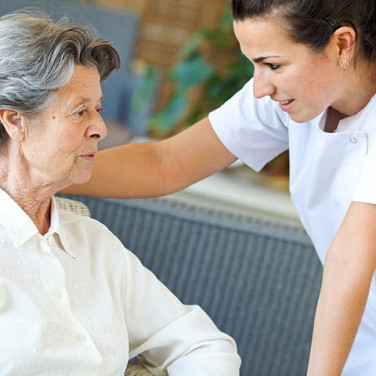As seniors prioritize their overall well-being, discussions about sexual health should be an integral part of the conversation with healthcare providers. Initiating these discussions may seem challenging, but open communication is essential for addressing concerns and seeking appropriate advice. Here's a guide to help seniors navigate conversations about intimacy with their healthcare providers.
 1. Recognizing the importance:
1. Recognizing the importance:
Understanding that sexual health is a crucial aspect of overall well-being is the first step. Seniors should recognize that healthcare providers are there to address all aspects of health, including sexual health, and discussing intimate concerns is both valid and encouraged.
2. Choosing the right moment:
Find YOUR ideal care home NOW!
Selecting an appropriate moment for the discussion is key. Seniors may feel more comfortable bringing up the topic during routine check-ups or dedicated wellness visits. It's important to choose a time when both the patient and healthcare provider can engage in a meaningful and unhurried conversation.
3. Framing the conversation:
Approaching the topic with a positive and matter-of-fact attitude can help ease the conversation. Seniors can express that they value their sexual health as part of their overall well-being and would like guidance on any concerns or changes they may be experiencing.
4. Being specific and honest:
To ensure a productive conversation, seniors should be specific and honest about their concerns. Whether discussing changes in libido, addressing pain during intimacy, or inquiring about potential medication effects, providing accurate details helps healthcare providers offer tailored advice.
5. Seeking Guidance on Changes:
Aging can bring about natural changes in sexual health. Seniors should feel comfortable seeking guidance on these changes, such as fluctuations in desire, challenges with arousal, or addressing any concerns related to sexual function.
6. Discussing medications and health conditions:
Certain medications and health conditions can impact sexual health. Seniors should openly discuss their current medications and any underlying health issues with their healthcare providers. This ensures a comprehensive understanding of potential influences on sexual well-being.
7. Inquiring about specialist referrals:
If necessary, seniors should inquire about specialist referrals. Healthcare providers can connect them with professionals specializing in sexual health or provide resources for additional support, ensuring that seniors receive comprehensive care for their concerns.
8. Regularly updating healthcare providers:
Keeping healthcare providers informed about any changes or concerns is an ongoing process. Seniors should view sexual health as a dynamic aspect of their overall well-being and feel empowered to discuss it regularly during healthcare appointments.
Tips for Starting Conversations on Senior Sexual Health
| Tip | Description |
|---|---|
| Be Open and Honest | Share your thoughts, concerns, and desires to build trust and understanding. |
| Schedule a Healthcare Check-Up | Ask your doctor about any physical or medical concerns that could affect your sexual health. |
| Use Clear and Respectful Communication | Approach conversations with your partner in a non-judgmental way to foster understanding. |
Initiating conversations about sexual health with healthcare providers is a proactive step towards comprehensive well-being for seniors. By recognizing the importance of sexual health, choosing opportune moments, and engaging in open and honest discussions, seniors can navigate these conversations with confidence, seeking guidance and support tailored to their unique needs.
Senior Home Plus is here to help you choose a care home or facility best suited to your needs. Do not hesitate to contact us on the following number: 0230 608 0055 or fill out this form.
Q&A:
1. Why is it important to talk about senior sexual health?
Talking about senior sexual health helps normalize the topic, address physical or emotional concerns, and improve quality of life and relationships.
2. Are seniors still interested in sexual intimacy?
Yes, many seniors remain interested in intimacy and experience the emotional and physical benefits of a healthy sexual relationship.
3. What challenges do seniors face in maintaining sexual health?
Common challenges include physical changes like reduced lubrication or erectile dysfunction, emotional barriers like grief or stress, and societal stigma around senior sexuality.
4. How can seniors address physical changes affecting their sexual health?
Seniors can use lubricants, explore medical treatments, engage in open discussions with their partners, and seek advice from healthcare providers.
5. What role do healthcare providers play in senior sexual health?
Healthcare providers can address physical or emotional concerns, recommend treatments, and provide a safe space for discussing sexual health topics.
6. How can seniors start conversations about sexual health with their partners?
Start by choosing a private, comfortable time to talk. Use clear and respectful language, focus on mutual needs, and share any concerns or desires.
7. Is safe sex still important for seniors?
Yes, sexually transmitted infections (STIs) can affect seniors. Using protection, like condoms, and regular health check-ups are essential for safe sex.
8. Are there emotional benefits to discussing senior sexual health?
Absolutely. Open conversations foster emotional intimacy, reduce stress, and improve relationship satisfaction.
9. How can seniors overcome stigma about their sexual health?
Education, open discussions, and finding supportive communities can help combat societal stigma and normalize senior sexuality.
10. What are the benefits of maintaining sexual health as a senior?
Benefits include improved mental and physical health, stronger emotional bonds, better self-esteem, and enhanced overall quality of life.

